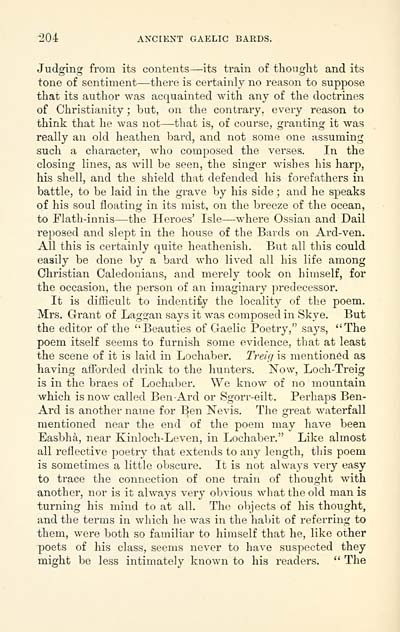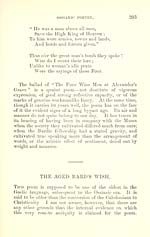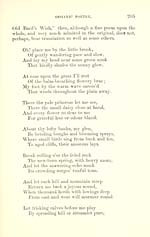Ossian Collection > Gaelic bards
(240)
Download files
Complete book:
Individual page:
Thumbnail gallery: Grid view | List view

■204 ANCIENT GAELIC BARDS.
Judging from its contents — its train of thought and its
tone of sentiment — there is certainly no reason to suppose
that its author was acquainted with any of the doctrines
of Christianity ; but, on the contrary, every reason to
think that he was not — that is, of course, granting it was
really an old heathen bard, and not some one assuming
such a character, who composed the verses. In the
closing lines, as will be seen, the singer wishes his harp,
his shell, and the shield that defended his forefathers in
battle, to be laid in the grave by his side ; and he speaks
of his soul floating in its mist, on the breeze of the ocean,
to Flath-innis — the Heroes' Isle — where Ossian and Dail
reposed and slept in the house of the Bards on Ard-ven.
All this is certainly quite heathenish. But all this could
easily be done by a bard who lived all his life among
Christian Caledonians, and merely took on himself, for
the occasion, the person of an imaginary predecessor.
It is difficult to indenti£y the locality of the poem.
Mrs. Grant of Laggan says it was composed in Skye. But
the editor of the "Beauties of Gaelic Poetry," says, "The
poem itself seems to furnish some evidence, that at least
the scene of it is laid in Lochaber. Treig is mentioned as
having afforded drink to the hunters. Now, Loch-Treig
is in the braes of Lochaber. We know of no mountain
which is now called BenArd or Sgorr-eilt. Perhaps Ben-
Ard is another name for Ben Nevis. The great waterfall
mentioned near the end of the poem may have been
Easbhà, near Kinloch-Leven, in Lochaber." Like almost
all reflective poetry that extends to any length, this poem
is sometimes a little obscure. It is not always very easy
to trace the connection of one train of thought with
another, nor is it always very obvious what the old man is
turning his mind to at all. The objects of his thought,
and the terms in which he was in the habit of referring to
them, were both so familiar to himself that he, like other
poets of his class, seems never to have suspected they
might be less intimately known to his readers. " The
Judging from its contents — its train of thought and its
tone of sentiment — there is certainly no reason to suppose
that its author was acquainted with any of the doctrines
of Christianity ; but, on the contrary, every reason to
think that he was not — that is, of course, granting it was
really an old heathen bard, and not some one assuming
such a character, who composed the verses. In the
closing lines, as will be seen, the singer wishes his harp,
his shell, and the shield that defended his forefathers in
battle, to be laid in the grave by his side ; and he speaks
of his soul floating in its mist, on the breeze of the ocean,
to Flath-innis — the Heroes' Isle — where Ossian and Dail
reposed and slept in the house of the Bards on Ard-ven.
All this is certainly quite heathenish. But all this could
easily be done by a bard who lived all his life among
Christian Caledonians, and merely took on himself, for
the occasion, the person of an imaginary predecessor.
It is difficult to indenti£y the locality of the poem.
Mrs. Grant of Laggan says it was composed in Skye. But
the editor of the "Beauties of Gaelic Poetry," says, "The
poem itself seems to furnish some evidence, that at least
the scene of it is laid in Lochaber. Treig is mentioned as
having afforded drink to the hunters. Now, Loch-Treig
is in the braes of Lochaber. We know of no mountain
which is now called BenArd or Sgorr-eilt. Perhaps Ben-
Ard is another name for Ben Nevis. The great waterfall
mentioned near the end of the poem may have been
Easbhà, near Kinloch-Leven, in Lochaber." Like almost
all reflective poetry that extends to any length, this poem
is sometimes a little obscure. It is not always very easy
to trace the connection of one train of thought with
another, nor is it always very obvious what the old man is
turning his mind to at all. The objects of his thought,
and the terms in which he was in the habit of referring to
them, were both so familiar to himself that he, like other
poets of his class, seems never to have suspected they
might be less intimately known to his readers. " The
Set display mode to: Large image | Transcription
Images and transcriptions on this page, including medium image downloads, may be used under the Creative Commons Attribution 4.0 International Licence unless otherwise stated. ![]()
| Early Gaelic Book Collections > Ossian Collection > Gaelic bards > (240) |
|---|
| Permanent URL | https://digital.nls.uk/76065141 |
|---|
| Description | Selected books from the Ossian Collection of 327 volumes, originally assembled by J. Norman Methven of Perth. Different editions and translations of James MacPherson's epic poem 'Ossian', some with a map of the 'Kingdom of Connor'. Also secondary material relating to Ossianic poetry and the Ossian controversy. |
|---|
| Description | Selected items from five 'Special and Named Printed Collections'. Includes books in Gaelic and other Celtic languages, works about the Gaels, their languages, literature, culture and history. |
|---|

